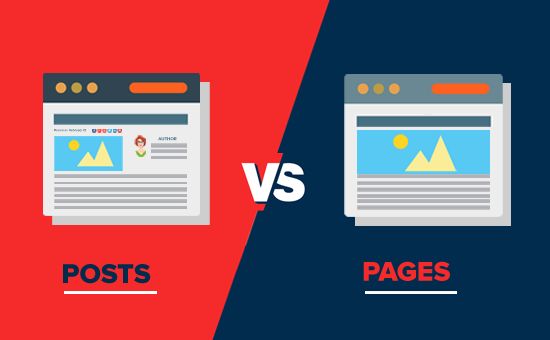WordPress అనేది ప్రపంచంలో అత్యంత ప్రాచుర్యం పొందిన కంటెంట్ మేనేజ్మెంట్ సిస్టమ్ (CMS). వెబ్సైట్ను సృష్టించేటప్పుడు, మీకు అనేక ఎంపికలు ఉన్నాయి, అందులో Posts మరియు Pages కూడా ఉన్నాయి. ఈ రెండు వర్గాలలో భిన్నతలు ఉన్నాయి, మరియు మీ కంటెంట్ను సరైన రూపంలో ఏర్పాటు చేయడం మీ ఆన్లైన్ వ్యాపారం లేదా బ్లాగ్ను ప్రభావితం చేయవచ్చు. ఈ వ్యాసంలో, మేము WordPress Posts మరియు Pages మధ్య తేడాలను మరియు వాటి ఉత్తమ వాడుక కేసులను పరిశీలించబోతున్నాము.
Understanding WordPress Posts
1.1 What Are Posts?
WordPress లో, Posts అనేవి సమీకృత కంటెంట్ ప్రాసెస్లలో విస్తృతంగా ఉపయోగిస్తారు. వీటిని సాధారణంగా బ్లాగ్ పోస్టులుగా పరిగణిస్తారు. ఇది సమయానుకూలంగా అప్డేట్ చేయబడుతుంది, మరియు ఇది మీ వెబ్సైట్లో అప్డేట్లను తక్షణంగా పొందడానికి ఆసక్తి ఉన్న వినియోగదారులను ఆకర్షించవచ్చు. Posts అంటే తేదీ, కేటగిరీలు, మరియు ట్యాగ్లు వంటి విషయాలను కలిగి ఉంటాయి, ఇది వాటిని సులభంగా వర్గీకరించడంలో సహాయపడుతుంది.1.2 Features of Posts
Social Sharing: Posts are more shareable on social media, which helps in driving traffic to your site. If your post goes viral, it can bring significant traffic.
Time-Based Content: Posts are typically displayed in reverse chronological order, meaning the newest content appears first. For example, if you post about “Latest Travel Trends,” it will appear at the top of your blog.
Categories and Tags: You can categorize and tag your posts for better organization. For instance, if you write multiple posts about travel, you can categorize them under “Travel” and tag them with “Adventure,” “Tips,” etc.
Engagement: Posts often allow for comments, encouraging discussions among readers. A post on “Travel Experiences” may invite readers to share their own experiences in the comments.
Understanding WordPress Pages
2.1 What Are Pages?
WordPress లో Pages అంటే స్థిరమైన కంటెంట్ను కలిగి ఉంటాయి, ఇది సాధారణంగా మీ వెబ్సైట్లో స్థిరంగా ఉండే సమాచారాన్ని అందిస్తుంది. ఇది మీ About, Contact, Services వంటి సమాచారం కలిగి ఉంటుంది. Pages are not time-sensitive and do not have categories or tags associated with them.2.2 Features of Pages
SEO Benefits: Static pages often rank better for certain keywords because they are not updated frequently, indicating stability to search engines. For example, your “Contact” page might rank well for search queries related to getting in touch with your business.
Static Content: Pages are meant for content that doesn’t change often. For example, an “About Us” page remains largely the same unless you update your business information, such as new team members or company values.
Hierarchy: Pages can be organized hierarchically. You can create sub-pages under a parent page. For instance, under your main “Services” page, you might have sub-pages for “Web Design,” “SEO Services,” and “Content Marketing.”
No Comments: By default, comments are usually disabled on pages, keeping the content focused and free from distractions. This is useful for important pages like “Privacy Policy” or “Terms and Conditions.”
Key Differences Between Posts and Pages
3.1 Content Type
Posts are typically used for time-sensitive content, while pages are meant for static information. For example, if you run a travel blog, each new destination article would be a post, but your “About Us” and “Contact” information would be pages.
3.2 Organization
Posts are organized using categories and tags, making it easy to sort content. Pages, on the other hand, are structured hierarchically, allowing you to create sub-pages.
3.3 Interaction
Posts encourage reader interaction through comments, whereas pages are generally more informational and do not invite discussion.
3.4 Frequency of Updates
Posts are updated regularly, while pages remain static unless changes are necessary. For instance, a blog post on “Top Travel Destinations 2024” might change with new travel trends, but your “Privacy Policy” page will stay relatively unchanged.
Best Use Cases for WordPress Posts
4.1 Blogging
Blogs are the most common use case for posts. They allow you to share your thoughts, insights, and experiences regularly. By using posts, you can engage your audience and encourage them to return for new content.
4.2 News Updates
If your website involves current events or news, posts are ideal. You can quickly publish articles and keep your audience informed.
4.3 Tutorials and How-Tos
If you want to provide tutorials or how-to guides, posts work well. Each tutorial can be a separate post that readers can easily find and share.
Best Use Cases for WordPress Pages
5.1 Informational Content
Pages are best for content that provides essential information about your business. For example, an “About Us” page can explain your mission and values.
5.2 Services Offered
If you offer services, you can create individual pages for each service. This allows potential customers to understand what you offer without sifting through blog posts.
5.3 Contact Information
Having a dedicated “Contact” page ensures that your visitors can easily find your contact details without navigating through posts.
5.4 Landing Pages
Pages are effective for creating landing pages designed for specific marketing campaigns. You can tailor the content and layout to encourage conversions.
Combining Posts and Pages for Best Results
6.1 Integrated Content Strategy
You can integrate both posts and pages in your content strategy. For instance, use posts to regularly update your audience on industry news, while maintaining pages for critical business information.
6.2 Internal Linking
Internal linking between posts and pages can enhance your site’s SEO. For example, if you write a blog post about travel tips, link it to your “Travel Services” page to guide readers to related content.
6.3 Content Promotion
Promote your posts on your pages. For instance, your homepage could highlight the latest blog posts, driving traffic to them while keeping your audience informed about your services.
Conclusion
WordPress లో Posts మరియు Pages మీ వెబ్సైట్ను ప్రభావితం చేయగల ప్రధాన అంశాలు. The key is to understand the differences between them and when to use each effectively. By strategically utilizing both posts and pages, you can create a more engaging and informative experience for your audience. Remember, the ultimate goal is to provide value to your visitors while enhancing your site’s functionality and SEO.
Final Thoughts
Creating a powerful WordPress website involves understanding how to use posts and pages effectively. With this knowledge, you can better serve your audience and achieve your online goals.
